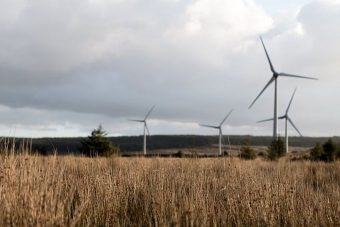
The government’s “outdated” ban on developing new onshore wind farms on mainland Britain is blocking access to the cheapest available form of new electricity generation, and having a negative impacts on bills, climate change targets, and businesses.
That is the conclusion of new research by the Energy and Climate Intelligence Unit (ECIU) think tank, which estimates electricity from 1GW of new onshore wind farms would cost £30m a year less than obtaining the same amount of power from new offshore wind farms, even when recent cost reductions from the offshore wind sector are taken into account.
Moreover, new onshore wind development costs in the UK would be as much as £100m a year lower per GW when compared to new nuclear or biomass plants, the report argues, adding that they wouldalso prove cheaper than new gas plants.
Since 2015, onshore wind farms in the UK have been denied access to any form of government support, effectively placing a freeze on new development.
Ministers said in the recent Clean Growth Strategy that remote islands of Scotland would be eligible to apply for support in the spring 2019 Contracts for Difference auction, potentially opening the door to some new projects in future.
However, the government has consistently failed to respond to repeated industry calls for well-located onshore wind farms to be allowed to compete for price support contracts.
The ECIU estimates that continuing to bar onshore wind farms from competing for contracts could cost the UK £1bn over four to five years when compared to developing other new power plants. The think tank is now calling for a policy rethink ahead of the findings of the energy costs review headed by Professor Dieter Helm, which is expected shortly.
ECIU director Richard Black described the ongoing block on mainland onshore wind farms as “perverse” given the UK’s windy weather and findings suggesting it is the cheapest form of new power generation around.
“For a government committed to making energy cheaper, this risks not only locking people into higher bills, but also runs contrary to its aim of having the lowest energy costs in Europe,” he said in a statement.
He also pointed to analysis carried out before the recent record-breaking offshore wind auctions showing that new onshore wind could be built without the need for subsidy, at below £50/MWh, even when additional costs relating to intermittency are taken into account.
“David Cameron promised no new subsidies for onshore wind,” Black argued. “But it now doesn’t need a subsidy – research indicates fixed-price contracts would more than pay for themselves. So, given that the government also knows it needs new low-carbon policies the question is, why not enable onshore wind where local people want it and where it won’t harm wildlife, while continuing to support a healthy mix of other low-carbon energy generation?”
Elsewhere, today’s ECIU report also argues the UK is set to fall to bottom place among comparable EU nations in terms of wind farm efficiency and that without further investment in new technology the country risks losing its place as a global leader in wind energy.
Dr Jonathan Marshall, ECIU energy analyst, said changing tack on onshore wind policy would be widely supported by the public.
“People are overwhelmingly in favour of renewable forms of energy, and onshore wind is one of the most popular forms of generation; surveys show that people are far keener on living next to an onshore wind farm than a fracking site or a small nuclear reactor,” he said. “The opportunity of repeating the British success story on offshore wind should also be a powerful motivator, and there would be added benefits in diversifying the UK’s energy mix. A policy rethink on onshore wind looks increasingly overdue.”
Responding to the report today, a spokesperson for BEIS said the government does “not believe that more large-scale onshore wind power is right for England”.
“We are pleased to see that established technologies, such as onshore wind and solar, are driving costs down,” BEIS said in a statement. “If this continues, and they have local support, they may play a significant role in the energy mix in future. We’re committed to supporting the development of onshore wind projects in the remote islands of Scotland and will set out further details shortly.”
But RenewableUK executive director Emma Pinchbeck welcomed the findings of the report, and called on the government to let the lowest cost options for energy compete on the market. “Having seen the record-breaking fall in the cost of offshore wind last month, we now need to discover how much the cost of onshore wind has fallen too – and that hasn’t been possible because it’s been excluded from competitive auctions,” Pinchbeck said in a statement. “New onshore wind, in places where there it has public support, can help Ministers achieve their goal of making energy costs for UK consumers the lowest in Europe.”
Source: businessgreen.com

